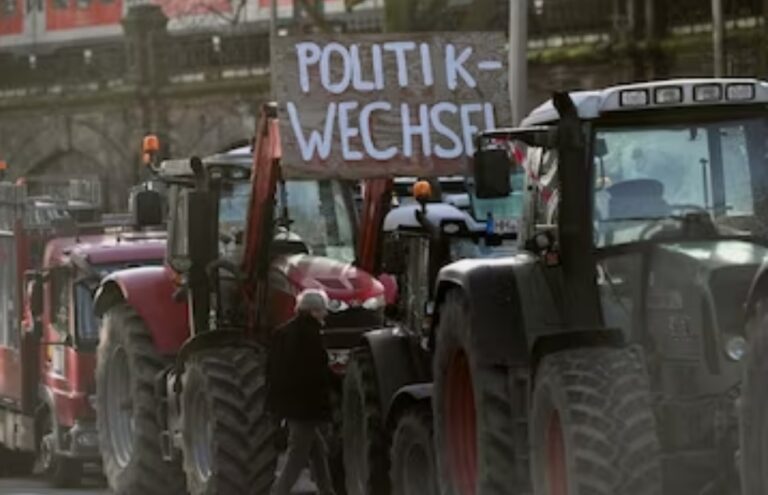News Desk, Kolkata : In a bold display of discontent, hundreds of German farmers rallied on Monday, steering their tractors to strategic positions that effectively crippled access to key ports across the country. The agricultural uproar surged as a vehement response to the government’s contentious decision to slash subsidies earmarked for the farming sector.
Around 100 tractors strategically lined routes leading to Hamburg’s sprawling port, a logistical behemoth and one of Europe’s busiest hubs for international container shipping. This audacious move by farmers aimed to underscore the depth of their opposition to Chancellor Olaf Scholz’s subsidy-cutting plans, initiated after a court ruling sent shockwaves through the government’s fiscal framework.
Not confined to Hamburg, the tractor blockades reverberated across other pivotal ports along Germany’s northern coast, namely Wilhelmshaven and Bremerhaven. The latter faced ongoing negotiations between farmers and law enforcement in an attempt to alleviate disruptions to the crucial harbor area.
The protest took a vehicular form of civil disobedience, with approximately 1,500 tractors snarling traffic across Hamburg, creating a spectacle that underscored the agricultural sector’s resolute stance against subsidy reductions. These actions marked an escalation in the series of protests that have been unfolding since December, sparked by the government’s abrupt shift in agricultural policy.
Chancellor Scholz’s initial subsidy-cutting proposal triggered widespread discontent among farmers, pushing them to the streets in a united front against what they perceived as a severe blow to their livelihoods. In a surprising turn of events, the government partially retreated from the stringent measures in response to the relentless demonstrations. The revised plan included reinstating a discount on vehicle tax and phasing out a diesel subsidy over several years, assuaging some concerns but falling short of satisfying the aggrieved farmers.
Undeterred by the concessions, the federation of farmers steadfastly called for a complete reversal of the subsidy cut plans, setting the stage for a protracted battle between the agricultural community and the government.
As tensions simmered in Germany, echoes of farmer discontent resonated beyond borders, finding solidarity in neighboring France. In a parallel display of defiance, French farmers took to blockading major routes, highlighting grievances related to pay, taxes, and regulatory constraints. The synchronized nature of these protests underscored a broader sentiment of dissatisfaction within the agricultural sector across Europe.
The tractor blockades served not only as a physical impediment to port operations but also as a symbolic manifestation of the farmers’ determination to be heard. Social media platforms buzzed with images and videos of the sea of tractors, transforming the protest into a viral sensation that captured the attention of both national and international audiences.
The government’s dilemma deepened as public opinion became increasingly sympathetic to the farmers’ cause. Calls for dialogue and compromise echoed from various quarters, urging authorities to reconsider the austerity measures that had triggered such vehement opposition.
Amidst the growing pressure, Chancellor Scholz found himself navigating treacherous political waters, attempting to strike a delicate balance between fiscal responsibility and appeasing an influential constituency crucial to the nation’s economy. The unfolding saga of tractor blockades became a focal point in national discourse, with citizens divided over the government’s handling of the situation.
As negotiations continued, the farmers’ blockades became a symbol of resistance against what many perceived as unilateral and economically detrimental decisions. The saga unfolded against the backdrop of broader debates about the role of agriculture, sustainability, and the delicate interplay between economic policies and societal well-being.
In the days that followed, the tractor blockades persisted, keeping ports paralyzed and the issue firmly in the public eye. The farmers’ resolute stance forced the government to reevaluate its approach, opening avenues for renewed discussions and a potential reconfiguration of subsidy policies.
The tractor protest, initially localized to German ports, had evolved into a powerful narrative of grassroots resistance, sparking conversations about the fundamental relationship between the state and its agricultural backbone. As the saga unfolded, it became clear that the reverberations of discontent had transcended mere economic concerns, morphing into a broader discourse about the values, priorities, and future trajectory of European agriculture.
DISCLAIMER
Our news media denounces any form of bias and disapproves of sensationalism. The disseminated news is entirely educational and aimed at social awareness. Our media maintains absolute impartiality, adhering solely to the purpose of education and social consciousness.


